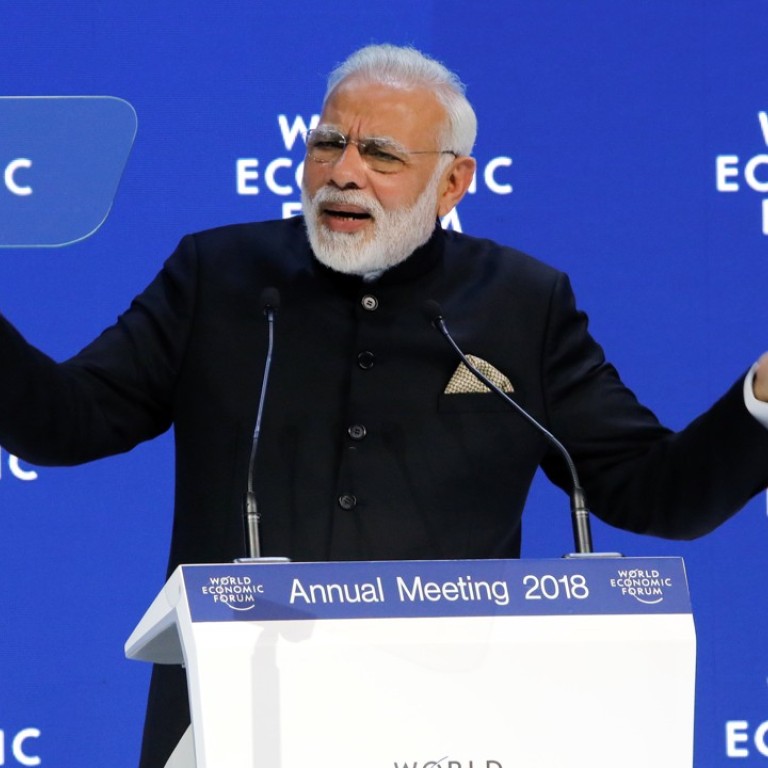
India Prime Minister Narendra Modi tells World Economic Forum globalisation is losing its lustre
US President Donald Trump’s ‘America First’ trade policy and tax overhaul dominated discussion on the second day of the World Economic Forum in Switzerland
Protectionism is gaining ground and globalisation is losing its appeal, but India is open for business, Prime Minister Narendra Modi told the World Economic Forum on Tuesday.
Modi led a big government and business delegation to the summit in Davos, the first Indian prime minister do so in 21 years, aiming to showcase India as a fast-growing economic power and a potential driver of global growth.
His comments on rising trade barriers came ahead of an address to the forum later this week by US President Donald Trump, who has championed inward looking policies for the world’s biggest economy.
“Instead of globalisation, the power of protectionism is putting its head up. Their wish is not only to save themselves from globalisation, but to change the natural flow of globalisation,” Modi said at the opening of the forum, which has attracted 70 heads of state and government, chief executives and top bankers.
“The result of this is that we are seeing new types of tariff and non-tariff-based barriers being imposed. Bilateral and multilateral trade negotiations appear to have come to a halt.
“There is a slowdown in cross-border financial investments and the expansion of [the] global supply chain appears to have slowed down.”
Trump has been pushing an “America First” policy of getting businesses to invest in the United States instead of overseas, potentially affecting the growth prospects of emerging economies such as India dependent on foreign investment.
During his 2016 election campaign, he blamed globalisation for ravaging US manufacturing jobs as companies sought to reduce labour costs by relocating to Mexico and elsewhere. Trump is due to address the forum on Friday.
BlackRock vice-chairman Philipp Hildebrand said Trump’s protectionist US trade policies were the biggest risk to a global economic recovery.
“It all depends on what ‘America First’ means,” he said. “If it means to fundamentally unravel and destroy the global trading order in a highly complicated supply chain world that would be bad news for the global economy.”
Meanwhile, the American leader’s recent US$1.5 trillion tax overhaul drew praise and warnings from finance chiefs at the annual meeting.
A month since Trump slashed the corporate tax rate to 21 per cent from 35 per cent and cut individual levies across the board, Stephen Schwarzman, the chief executive officer of Blackstone Group LP, said such reductions would spark investment in the US.
“There are going to be a lot of flows into the United States, and this is an underestimated to forgotten aspect of the US tax reform,” Schwarzman said. “There are companies all around the world now looking at US, saying this is the place to be in the developed world,”
But not everyone at the gathering – where billionaires, world leaders and investors hobnob and discuss topics ranging from the global economy and sexual harassment, to the risks and opportunities of artificial intelligence – were sold on Trump’s tax overhaul.
Brian Moynihan, chief executive of Bank of America Corp., said a 4.1 per cent unemployment rate meant the “reality of bringing a lot of jobs back is difficult. Where are the people to do the work?”
Frank Appel, the chief executive of Deutsche Post AG, predicted the tax cut would deliver a “limited short-term impact”, but would swell the budget deficit and wouldn’t do anything to boost productivity.
The debate came a day after the International Monetary Fund cited the tax revamp as a reason it now expected stronger expansion globally this year and next. But it added the effect would wear off by 2022 as some of the individual cuts expire and the US tries to curb its budget deficit.
Reporting by Reuters and Bloomberg
